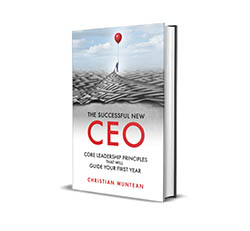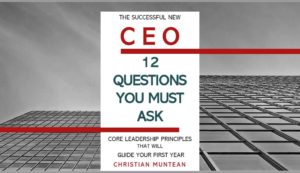How to Lead Without Power: The Three C’s

How to Lead Without Power: The Three C’s One very common question that I’m asked is, “How do I lead up?”
Line supervisors and middle management often feel trapped and frustrated. They are trying to produce success while navigating the downstream impacts of upstream decisions or practices. They often don’t feel like they have a “voice” up.
But they aren’t alone. CEOs can feel similarly as they work with their boards.
And a related question, “How do I lead sideways?” is often asked by board members themselves, partners in a company, or even colleagues on a team.
The real question is, “How do I influence change when I don’t have power?” It’s a great question.
My entire career is based on my ability to answer this question. As a consultant, I have no power. Zero. No client hands me a checkbook or delegates authority to me.
But I do have influence. In fact, it’s all that I have. So, I pay close attention to its cultivation and retention.
Power vs Influence
First, let’s define a couple of terms:
- Power: Power is the ability to make something happen. For most leaders, this is derived through their position and the resources or opportunities they control.
- Influence: Influence is the ability to affect or shape how someone thinks, decides or acts. Usually in important ways. For most leaders, this is developed through earning the trust and respect of others.
Power and influence aren’t mutually exclusive. And there aren’t fixed lines between the two.
Power can be more straightforward to obtain – climb the corporate ladder. But because it is often tied to position, it can easily be lost.
Influence usually takes time to build. The results are less guaranteed. But because it is nearly always tied to your reputation as a person, it is more easily sustained through external changes.
Who needs influence?
Power, exercised on its own, tends towards either coercive or transactional leadership. That is, it is compliance-focused – usually through some form of carrots and/or sticks. As long as others feel rewarded for compliance or are afraid of the consequences of non-compliance, it can work.
Influence allows leaders to persuade how others think, decide and act without forcing it. This can be exercised with or without having power. Because it is about persuasion rather than compliance, it can initially take more time, but over the long term requires less effort to sustain.
There are times for both. Neither is right or wrong. They are tools. Everything depends on how the tools are used.
How is influence built?
Whether you are a CEO working on expanding your use of your “tools” or you don’t even have a leadership role but are drawn to impact change – the core principles for building influence are the same. Influence is built through cultivating the Three C’s:
- Credibility
- Competency
- Care
Credibility: Credibility is the currency of leadership. It means two things. First: Can you be trusted? Will you do what you say you will do? Second: Do your actions consistently reflect the character you claim?
Building credibility takes time and opportunity. Some very high potential leaders lack credibility just because they haven’t given it the time to develop or taken the opportunities that allow others to observe them. To correct this, cultivate patience but also look for opportunities to put yourself on display.
The executive coaching process I use is highly transparent for three reasons: It creates the accountability that drives results, it regularly solicits inputs from a leader’s stakeholders – so we know what needs to be targeted, and it helps stakeholders recognize the growth and change that has occurred.
Many executives work hard to grow or change in some way. But if people’s attention isn’t being called to it – they often won’t notice.
Other leaders lack credibility because they don’t follow through, aren’t consistent, or act in ways that are dissonant with their stated values. If that is your experience, then you need to correct this. To begin this, start acting credibly: Follow through, be consistent and act in alignment with stated values.
When repairing credibility, sometimes even more time and opportunity are needed for people to change their perspectives.
Competency: The ability to do something well creates influence. When you are known for being competent and the competency is reliable and consistent, your influence will grow.
Technical skills matter. Also, they are usually (not always) a given. Especially as they relate to the core service or functions of your organization or team. But there are two areas of competency that many leaders overlook:
-
- Self-mastery: Being disciplined with your own priorities, time, health, and emotions matters. Leaders who are seen as “in control of themselves” are more highly regarded than those who seem like wild cards.
- Leadership: The ability to actually lead – to align people’s actions around a shared vision, is often overlooked. This includes being able to set an example, to mentor and grow others, to challenge people and processes when appropriate, and to be encouraging.
Regularly cultivate your key competencies. Expand on them when you can. Find opportunities to use your competencies, especially to bring value to others. This will help others recognize them.
Care: Teddy Roosevelt said, “Nobody cares how much you know until they know how much you care.” When people believe you care about them and the people or things that matter to them, they are more open to being influenced by you.
This is a soft skill. Some leaders seem to come by it naturally. For others, it feels very foreign. I’ve met many leaders who did care about others but resisted the idea that it might be helpful to act and speak in ways that caused others to know it. They struggle to persuade people as a result.
Speaking candidly, my personal approach is often very objective and matter-of-fact. Over the years, I’ve found that people readily recognize that I’m credible and competent. But, especially earlier in my career, I didn’t appreciate how important it was that they felt I cared about them.
Going back to the Roosevelt quote, if we don’t care about others – that’s a problem. But even if we do care but don’t demonstrate that in a way that others recognize – it’s still a problem.
In my mind, being credible and competent was an expression of care. But, for many, empathy and encouragement were lacking. As I’ve worked on that over the years, my influence has grown.
The Three C’s Combined
Credibility, Competency, and Care allow you to cultivate a significant influence. When other people know you for all three of these characteristics – they are much more open to allowing you to shape how they think, decide and act. In fact, they aren’t just open to it, they will often begin to seek you out.
Influence takes more time to build. But, if maintained, can ultimately help you accomplish far more.
Questions for growth:
- Which is the most natural for you? How can you lean into that strength?
- Which is the most challenging? How can you grow in this area?
Take good care,
Christian
Free Leadership Resources
Whether you are a new CEO, thinking of succession or exit, or wanting to strengthen your leadership and your team, I’ve got resources to help:
Enhancing your leadership skills
Are you interested in learning more about becoming a successful CEO? If so, get a free copy of my book The Successful New CEO. Not a new CEO? I’ve been told by “old hands” that they felt any CEO should read this. So, click here to get your copy today.
by “old hands” that they felt any CEO should read this. So, click here to get your copy today.
Let’s connect.
I’m passionate about helping leaders to create workplaces they love going to and increasing the value of the services they offer. My results-oriented approach is tailored to each client’s specific situation and needs. As a leadership coach, I have developed a wealth of resources to help you and your team grow and become stronger.
Weekly Newsletter – sign up to receive my weekly articles addressing critical leadership challenges and issues.
The Leadership Coach Podcast – In my podcast, we explore effective, high-impact, and enjoyable leadership. Subscribe.
There are 𝟭𝟮 𝗰𝗿𝗶𝘁𝗶𝗰𝗮𝗹 𝗾𝘂𝗲𝘀𝘁𝗶𝗼𝗻𝘀 to ask before accepting a new CEO position. Do you know what they are? Instantly download my free e-book here.
Find the value of your company with my free assessment tool: The Value Builder System
The Value Builder System™ is a 13-minute online questionnaire that evaluates your business on the eight factors that contribute more to its attractiveness and value. These factors are scored on a scale of 1-100. Businesses that score over 80 are likely to command 70%-100% higher value than others.
Opportunities
Executive and Leadership Coaching: Do you feel overwhelmed? Are you not getting the results you expect from the effort you are putting in? Do you find yourself facing similar challenges time and time again? Would you like to change specific ways of relating or reacting? If you would like to experience predictable, measurable growth Contact me.
Profitable Exit Strategy Workshop: Are you a business owner or partner? Over 55? Starting to think about exiting your business or active management in the next 3-5 years?
- Curious about what your business might be worth?
- Would you like to discover the specific steps you need to take to increase its value and become highly attractive to a buyer?
- Are you planning on handing it over to family or employees and you want to ensure long-term success?
If so, contact me now
Article Categories
Popular articles

Download my free 10-page eBook:
How To Accomplish More Without Doing More:
Eight Proven Strategies To Change Your Life
Discover how to save eight hours during your workweek-even if you're too busy to even think about it. The resource every maxed out executive needs.

